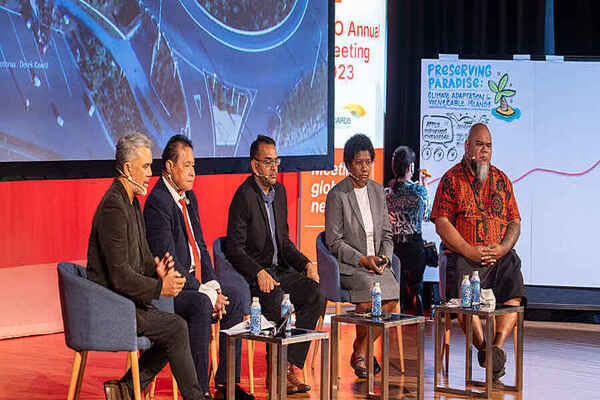


The ISO Annual Meeting 2023, hosted by Standards Australia, highlighted the pivotal role that International Standards play in meeting global needs and accelerating progress towards achieving the United Nations Sustainable Development Goals (SDGs).
The five-day event served as a platform to unite efforts, leverage technology and prioritize sustainability in the pursuit of a better future for all.
More than 4 000 participants from over 140 countries participated. The programme featured over 20 sessions with an extraordinary line-up of speakers, including business and industry leaders and high-level government officials.
In an era defined by rapid technological advancements, futurist and visionary Chris Riddell gave an electrifying opening keynote address, setting the tone for days ahead. Riddell provided attendees with a riveting glimpse into the future and the need for organizations to be prepared.
Fascinating conversations were had about the transformative impact of technologies such as artificial intelligence (AI), metaverse and convergence-related issues. Cybersecurity was cited as a paramount concern. Experts highlighted the evolving threat landscape and the importance of robust cybersecurity standards to protect critical infrastructure, data and individuals.
The ISO Annual Meeting shined a spotlight on the increasing urgency for AI standards in shaping the technological ecosystem. This year’s LDE Award celebrates a trailblazing subcommittee on AI laying the groundwork for future developments in this field. The joint ISO and IEC subcommittee on AI was honoured for its effective leadership, innovative approaches and proactive management and best practice in developing standards for the rapidly evolving technology.
Trust emerged as a compelling theme, resonating across discussions on international trade, anti-corruption and sustainability, and underscoring the critical role of standards in policy to build a more trustworthy global landscape.
“Unless you have that trust, you have more uncertainty. Trade always suffers when there is uncertainty,” said Erik Wijkström from the World Trade Organization. International Standards can help ensure transparency, accountability and credibility, so that sustainability commitments can translate into meaningful action on the global stage.
Unveiled at the ISO Annual Meeting, two ambitious toolkits – ISO Policy Toolkit and ISO Climate Action Toolkit – serve to help position standards at the forefront of the policy agenda, bridging the gap between government and national standards bodies. By making standards an integral part of the discussions, the toolkits will help policymakers use and reference standards in policy frameworks.
Repeated throughout almost every session and during discussions, speakers and participants alike were clear in their message that, by working together, sharing knowledge, and harmonizing efforts, the global standards community can accelerate the pace of change needed to create a more sustainable world.
Climate solutions for small islands featuring (from left) Derek Kawiti, Professor, Maori Designed Environments & Indigenous Technologies and Architect; Hon. Crossley Tatui, Minister for Infrastructure and Finance (Niue); Kushaal Raj, Director of Climate Change, Fiji Climate Change & National Designated Authority; Esline Garaebiti, Director General, Ministry of Climate Change Adaptation, Meteorology, Geo-Hazards, Environment, Energy and Disaster Management (Vanuatu); and Hon.Vaimu’a Muliava, Minister of Digital transformation, Technological innovation, Construction and Public Service (New Caledonia).
“Through International Standards, we can create a framework allowing our ambition to echo through the whole world,” said Honourable Crossley Tatui, Niue’s Minister for Infrastructure and Finance. The Honourable Minister was among several leaders from Pacific islands sharing their insights on the devastating impacts of climate change that threaten their ecosystems, economies and overall wellbeing. Effective climate mitigation and adaptation standards are crucial to help this region better face the volatilities of climate change.
Climate was also a dominant theme at the ISO General Assembly, which brings together representatives from ISO members around the world and is always one of the highlights of the ISO Annual Meeting. ISO’s climate commitment was given greater momentum with the inclusion of a strategic priority on environmental sustainability, enshrined in the updated ISO Strategy 2030.
A landmark new partnership was announced with the United Nations Development Programme (UNDP) to enhance sustainability action. Building on the unique contributions of each organization, the commitment aims to enhance International Standards that advance sustainability actions in both the public and private sectors.
“By helping to shape new management standards for businesses and investors, UNDP and ISO can ensure that sustainability and the SDGs are not just an add-on to business – they will be an intrinsic part of how all business is done,” said Achim Steiner, UNDP Administrator. “With better practices, we will achieve better outcomes for business and investors – and better outcomes for people and planet.”
As the ISO Annual Meeting 2023 drew to a close, leaving a sense of hope and anticipation in its wake, momentum for change is stronger than ever. This year’s gathering showcased the unwavering commitment of the international standards community to addressing global challenges together.
“Our shared pursuit of creating standards that transcend borders and boundaries is realized through the efforts of members […] where mutual respect and cooperation are the driving forces,” said Ulrika Francke as she completes her term as President of ISO at the end of 2023.
The challenges ahead are significant, but with international collaboration at the heart of standards work, and a collective dedication to a more sustainable world, we are poised to make meaningful strides towards a better future.